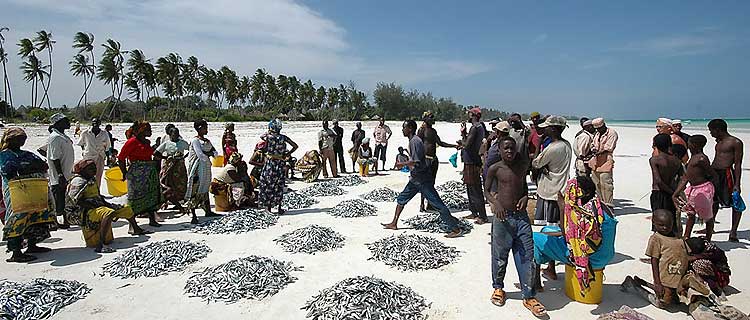
Social-ecological tradeoffs
Trash fish or fine fish?
New project reveals tradeoffs between fishing intensity and financial profitability
So here's the dilemma: you can choose to boost employment in a community and increase the capture of fish by fishing heavily or you reduce the fishing effort thus securing the marine biodiversity while catching bigger fish that has higher financial value. The problem is that the second option would mean less people employed. What's it to be?
These are the kinds of questions centre researchers Tim Daw, Diego Galafassi and Garry Peterson address with colleagues from Kenya, UK, Canada and South Africa in a project on ecosystem services and tradeoffs. The project is done in collaboration with researchers from the Wildlife Conservation Society and the Universities of East Anglia, British Columbia, Northumbria. The project, entitled Participatory Modelling of Wellbeing Tradeoffs in Coastal Kenya (P-Mowtick), looks at how dilemmas such as the one above affects a coral reef area on the outskirts of Mombasa.
Keeping everybody happy
Various stakeholders of the local community such as fishers and traders have participated in the project and asked to give their perspectives on how different management strategies impact their wellbeing.
Feedbacks from these stakeholders were then brought together to assess how fishing activity and the ecological system would lead to different types of ecosystem services and trade-offs between the wellbeing of each of the primary stakeholders and three management objectives: ecological conservation, economic profitability and fish production.
"The interesting dynamic was that the nature of fishing activities alter the ecosystem and the nature of ecosystem services produced. For example heavy fishing with unselective and illegal beach seine nets can damage habitats, but also produce large volumes of poor quality cheap fish. These changes in ecosystem services then have direct distributional and wellbeing impacts as the 'trash fish' supports the businesses of poor female fishmongers who process it for local consumers. A reduction in fishing effort would result in a better ecological status and more profitable fishery of lower inputs and larger fish, but these fish would enter different markets and benefit different stakeholders," Tim Daw says.
Trade-offs consequently emerge from both ecological and social dynamics, and present hard choices and challenges both for management and for commonly held views on sustainable fisheries.
Playing with scenarios
Tim Daw and his research colleagues also developed four narrative scenarios of the future, which illustrated trade-offs in the system. The scenarios were represented in pictures for discussion with stakeholders.
Later consultations with the stakeholders revealed an improved awareness and ability to consider trade-offs and that their experience of the workshop will affect some of the decisions or activities in their work.
"The next steps for the project are to demonstrate the model to the primary stakeholders, discuss and finalise a policy brief based on the outputs from our stakeholder interactions and present these to policy-makers within Kenyan Government," Daw says.
Further info
Other project documents, including workshop reports are available on the ESPA project website






